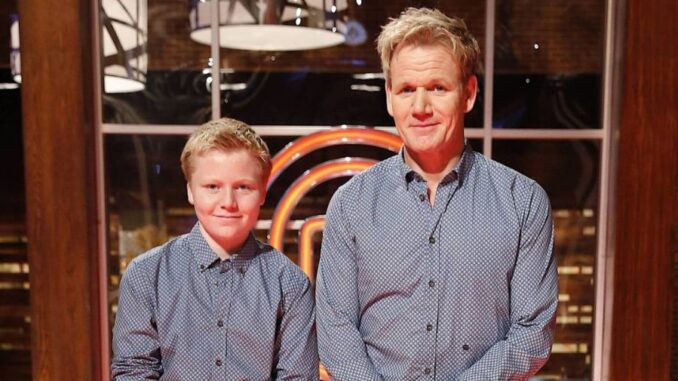
When you walk into Jack’s kitchen, there is a certain energy that feels oddly familiar, as if you’ve stepped into one of Gordon Ramsay’s fiery television sets. The clang of pans, the roar of instructions, the sharp wit delivered with a heavy dose of sarcasm—all of it feels like déjà vu. But Jack is not Gordon Ramsay. He is a chef of his own making, a culinary powerhouse who has taken inspiration from Ramsay’s style but transformed it into something unique, something that makes him stand tall in his own right.
It’s a funny thing, the way culinary legends pass their influence forward. Some chefs inherit recipes, others inherit techniques, but Jack inherited an attitude. To him, food is not just about nourishment, nor just about art—it is about command. His kitchen is his stage, his crew the orchestra, and the plates he sends out to diners are the symphonies that linger long after the curtain has fallen.
Much like Ramsay, Jack believes that chaos in the kitchen must be tamed through passion and discipline. His apprentices joke that his scolding burns hotter than the ovens. Yet, beneath the stormy exterior, there is an unmistakable care, a drive to bring out the best in those who work under him. He knows that every great chef is not born but made through trials, sweat, and a stubborn refusal to settle for mediocrity.
Ramsay himself once said that standards are the soul of the kitchen. Jack took that philosophy and ran with it, but with his own twist. Where Ramsay brought raw fire, Jack brings calculated heat. Where Ramsay thrives on breaking down egos before building them back up, Jack prefers to push his cooks to break their own limits. He knows how to craft pressure into motivation, turning mistakes into lessons rather than humiliations. The kitchen may still echo with his sharp critiques, but his intent is never cruelty—it is transformation.
The comparison between Jack and Ramsay is inevitable, but it also raises a larger question: how do culinary legends take shape? At what point does a chef stop being a disciple of another and start becoming a master in their own right? With Jack, that line has already been crossed. His menus, while bold and modern, are deeply rooted in traditions of French cuisine and global flavors. His plating tells stories that Ramsay himself never told. His flavors explore territories where Ramsay never walked. Yet the shadow of influence is unmistakable, and Jack does not deny it. Instead, he embraces it.

He often jokes that in forty years, when people look back at the world of cooking, they might not know who influenced whom. They might laugh and say Ramsay was simply Jack’s predecessor, or even imagine playful myths about their connection. But at the heart of that humor lies an important truth: legacies are cyclical. Today, Jack is seen as a chef molded in Ramsay’s fiery image. Tomorrow, Jack will be the one inspiring a new generation, who may imitate his voice, his movements, his discipline, and his signature style of service.
The beauty of culinary culture is that it thrives on this chain of influence. Recipes passed from mother to child become restaurant empires. Techniques developed centuries ago are reinvented on television shows. The legends of one era become the stepping stones of another. For Jack, his admiration of Ramsay is not a burden—it is a foundation. Without Ramsay’s example of ruthless honesty, Jack may never have found his own fearless approach to cooking. Without Ramsay’s television dominance, Jack may never have realized that chefs could be cultural icons, not just invisible hands in the back kitchen.
But Jack is not content with being a mere shadow. His story is one of transformation. Born in a small town, with little access to fine dining, he grew up watching Ramsay’s shows late at night, imagining himself in those bustling kitchens. While his friends dreamt of rock stardom or business success, Jack dreamt of the sizzle of steak on a hot pan and the crisp perfection of a well-risen soufflé. That dream carried him across oceans, into culinary schools, and eventually into Michelin-starred restaurants, where he refined his craft.
Now, his restaurant has become a pilgrimage site for food lovers who crave more than just flavor—they crave an experience. Diners say that eating at Jack’s establishment is like stepping into a story, each course revealing a new chapter. His food does not just fill the stomach; it challenges the mind and stirs the soul. He uses ingredients not simply for their taste, but for the emotions they evoke. A smoked fish dish carries the memory of his childhood by the sea. A bitter chocolate dessert mirrors the harsh lessons he endured in his early days in the kitchen. Everything is intentional, and everything is alive.
In many ways, that is what sets Jack apart from Ramsay. While Ramsay’s television persona has sometimes overshadowed his artistry, Jack has chosen a quieter path. He is less concerned with celebrity and more focused on legacy. To him, fame is not measured by how many television episodes he hosts, but by how many young chefs he inspires to carry forward the torch.
The comparison between Jack and Ramsay is both inevitable and reductive. Yes, they share a style. Yes, their kitchens thunder with the same intensity. But the world of food is vast enough to hold more than one fiery genius. Jack is proof of that. He is not here to replace Ramsay, nor to compete with him. He is here to build upon the foundation and, in doing so, carve out his own legend.
